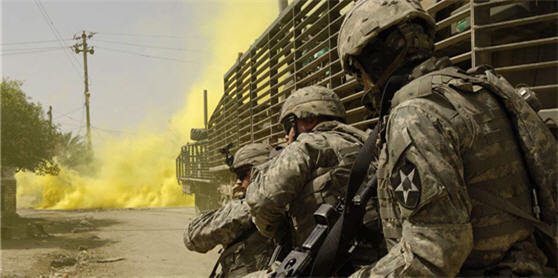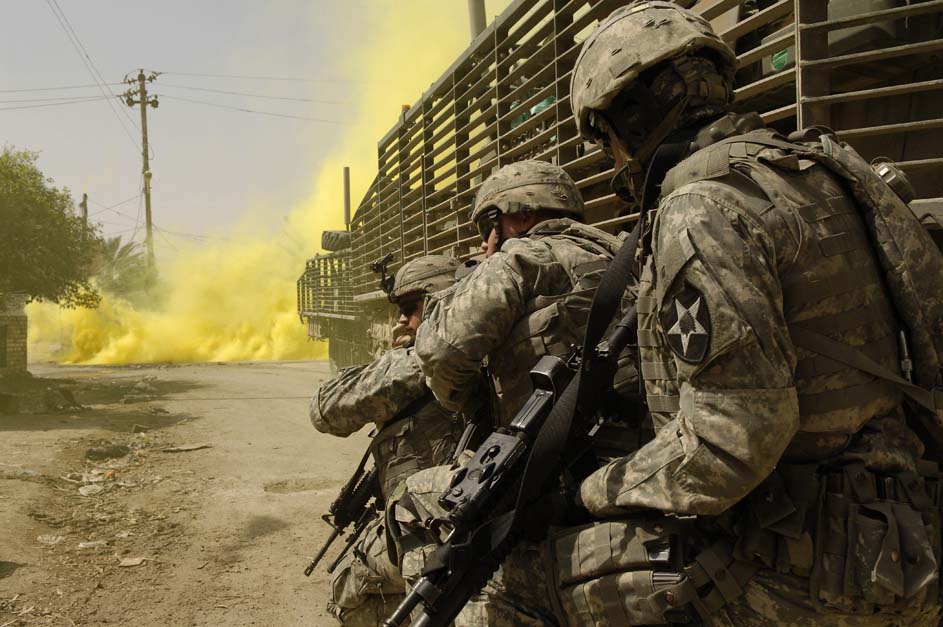
Steven Metz, who teaches at the Army War College’s Strategic Studies Institute, reports that he was attending a recent DoD symposium and that “everyone nodded when a speaker said that the threats of the future will be dispersed, non-state entities, but few seemed to understand that this obviates the very essence of American strategy and the current focus of the military”
.
Precisely. Yet, the ongoing debate between what Andrew Bacevich calls Crusaders and Conservatives regarding the future of US military doctrine seems to miss this critical point. On the hand, we have Crusader John Nagl, the new head of the Center for a New American Security, who argues that the security challenges of the 21st century will require that the U.S. military be positioned “not just to dominate land operations, but to change entire societies.” On the other hand we have West Point professor Gian Gentile who argues that the military, “ought to be weighted more heavily toward the requirements of conventional warfare.”
But as Metz points out, perhaps both Gentile and Nagl have it wrong. For starters, the enshrining of counter-insurgency doctrine presupposes that these types of conflicts will be “the face of battle in the 21st century.” I find this very hard to swallow. Not only is there a lack of political will in the US to engage in the sort of long-term counter-insurgency that we fought in Iraq, but I’m not so sure why we would want our military to engage in this type of conflict. If the Iraq War has shown us anything it is that counter-insurgency is not the most effective type of war for the US military to be fighting – and that the benefits that might be gleaned from such a conflict would be more than outweighed by the costs. Now some might argue that we have no choice but to fight such a conflict that it will be forced upon us. My response is poppycock. The only reason the US would fight a counter-insurgency is if we choose to; and that’s a choice we simply should not make because in part, it is difficult to contemplate any sort of protracted counter-insurgency that will further US interests.
As Bacevich succinctly puts it, “If counterinsurgency is useful chiefly for digging ourselves out of holes we shouldn’t be in, then why not simply avoid the holes? Why play al-Qaeda’s game? Why persist in waging the Long War when that war makes no sense?”
But because Nagl overemphasizes counter-insurgency it does not mean that Gentile’s focus on conventional warfare is correct either. First of all, in an era when the control of territory has taken on far less importance in US strategic thinking the term “conventional warfare” may not mean what he have traditionally thought it means. Again Metz is spot-on in his analysis: “If you buy the notion that future threats will not be linked to a particular piece of geography — enemies can mobilize resources and undertake operations from almost anywhere–then seizing and controlling terrain will no longer be the essence of security.”
Gentile identifies three possible future conflicts that might entail fighting a conventional war, “A clash between Iranian forces and an American combat brigade in Iraq could erupt in a minute. A North Korean march on Seoul will not be a fight for hearts and minds. Nor will ground fighting on Taiwan in the event of a Chinese assault.” But realistically, each of these conflicts, and in particular the latter two will likely not involve a major conventional engagement. If North Korea marches over the 38th Parallel or China invades Taiwan (and really why would either country do something foolish) the Army is unlikely to play a leading role; instead it will be the Air Force and Navy respectively. Does anyone believe that the US should be fighting another land war in Asia? And what about Iran? Well one would hope that after 6 years and more than 4,000 dead in Iraq we would have learned our lesson in the Middle East as well.
In the end, perhaps the focus of the US military and American foreign policy, writ large, should be to avoid counter-insurgencies — AND AVOID CONVENTIONAL CONFLICTS.
Where Nagl and Gentile fall short in their analysis of the future of the military — and where I think Metz is on to something — is the confusion of tactics with strategy. Before deciding whether the US should be focusing on counter-insurgency vs. conventional warfare strategies perhaps the better question should be, What are the greatest threats facing America in the 21st century and what kind of military do we need to confront them?
Metz identifies the challenges confronting the US as “dispersed, non-state entities.” I would add to that list a host of transnational issues, starting with climate change and moving down the list to health pandemics, global economic instability, vast criminal networks, failing states, the rise of semi-authoritarian governments etc. Guess what? It’s not easy to bomb any of these challenges.
The means of best confronting non-state actors or multinational threats is not the sledgehammer of US military force it is instead of confluence of diplomatic engagement, law enforcement tactics, civilian development agencies, democracy and good governance promotion and in some cases, our armed forces. While one could argue that this has always been true, the reality has been quite different. More often than not, we perceive our security threats in military terms and choose to respond in kind. But its about time we recognized that the military is not the primary tool in our arsenal for confronting security challenges, but simply one of many – and in some cases, perhaps the least effective.
Indeed, Metz says at the end of his post, “20 years hence, the U.S. Army’s role in promoting American security will decline precipitously.” What I find most surprising about this assertion . . is that anyone finds this assertion surprising. If I could give one piece of advice to President Obama’s national security team that I would hope they would follow, it is to assume that Dr. Metz’ prediction is correct.
Michael A. Cohen is a senior research fellow at the New America Foundation. A previous version of this essay was published at Democracy Arsenal. U.S. Army Photo.
Image: iraq-coin.jpg
